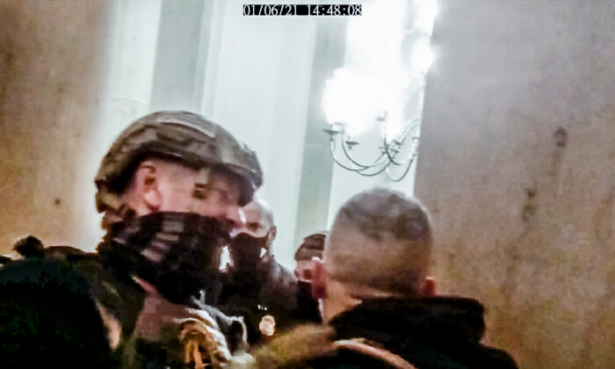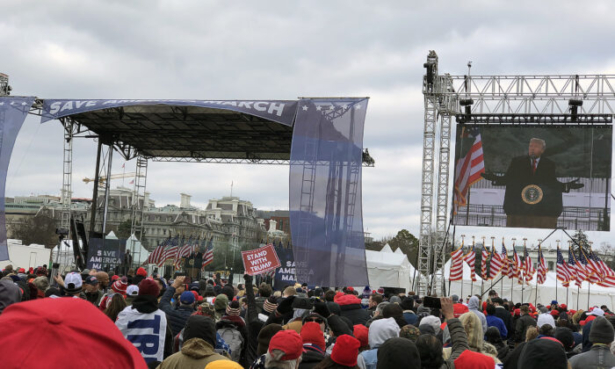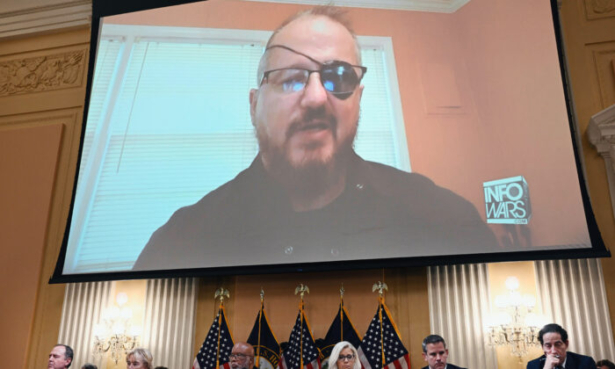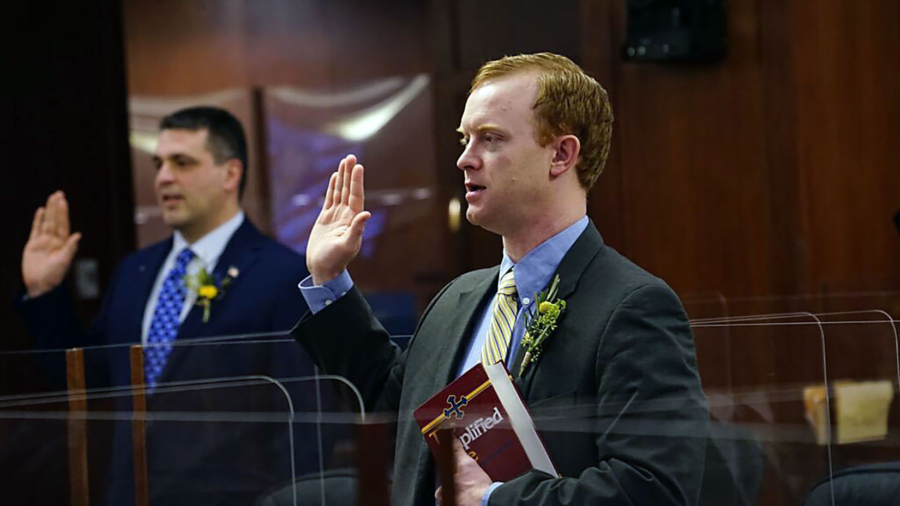Despite ruling that the Oath Keepers took concrete actions to overthrow the U.S. government on Jan. 6, 2021, an Alaska judge concluded on Dec. 23 that state Rep. David Eastman cannot be barred from office under the Alaska Constitution because he is a member of the Oath Keepers.
Alaska Superior Court Judge Jack McKenna issued a 49-page ruling (pdf) one day after the conclusion of a civil trial held to determine if Eastman should be removed from office because he is a life member of the Oath Keepers.
McKenna stayed his ruling to allow the parties to file appeals to the Alaska Supreme Court. A status hearing was set for Jan. 4, 2023.
“We’re pleased that Judge McKenna agreed with us that Representative Eastman should not be removed from office just because he attended President Trump’s speech on January 6,” defense attorney Joseph Miller told The Epoch Times in a statement.
“As we argued from the very beginning in this case, the First Amendment protects the rights of association and speech that were attacked here,” Miller said.
Judge McKenna concluded that the Oath Keepers “advocated concrete, imminent action directed at the violent overthrow of the United States government and engaged in conduct that attempted to bring about that aim.
“…The court further finds that Rep. Eastman is a member of that organization but that he does not and did not possess a specific intent to further the Oath Keeper’s words or actions aimed at overthrowing the United States government. The court, therefore, finds that he is not disqualified from holding public office…”
McKenna’s split conclusion did not fully please either side.
Despite defeating the effort to toss him from office, Eastman saw dark storm clouds in the rest of the ruling.
“The takeaway is Trump and any group that will go to bat against the left must be eliminated, either destroyed or otherwise rendered inert,” Eastman told The Epoch Times in an email.
“Oath Keepers must be rendered inert. J6ers must be rendered inert. This trial helps achieve that goal,” Eastman said.
“This trial of mine is just an attempt to manufacture one more dot in their eternal effort to connect enough dots to deny Americans the ability to choose elected officials that will do battle with the left in the halls of government, especially in the White House,” he said.
In the Nov. 8 general election, Eastman won a two-year term in the 27th House district by a 24-point margin. In the fall of 2020, he secured more than 70 percent of the vote. The legislative session that begins in January will be his fourth.
Plaintiff Randall Kowalke, a former Republican who ran against Eastman in 2020, filed a lawsuit in July 2022 to oust Eastman from the Alaska Legislature under a Cold War-era loyalty provision in the state constitution.

“We’re obviously disappointed by the outcome and need to figure out our next steps,” Goriune Dudukgian, who represented Kowalke, said in a statement to the Associated Press.
The case, filed in the middle of the 2022 campaign, forced Eastman to search for and turn over some 300,000 documents, his attorney said. Because he was sued in his personal capacity, Eastman said, he will likely have legal expenses of more than $300,000.
Overthrow Government?
Kowalke’s lawsuit produced an extraordinary legal conclusion from Judge McKenna: that the Oath Keepers took “concrete action to attempt to overthrow by violence the United States government.”
Miller said there was no factual basis for that conclusion.
“We are disappointed in the court’s determination that Oath Keepers is an organization that sought to overthrow the government by force or violence,” Miller said, “and believe there was no admissible evidence supporting that finding.”
Judge McKenna reached that conclusion largely based on the input of Jonathan Lewis and Matthew Kriner, two think-tank analysts whose testimony seemed to place most actions of the Oath Keepers over its 13-year history in an anti-government, even revolutionary, light.
During trial testimony, Oath Keepers founder Elmer Stewart Rhodes III said he never ordered anyone to go into or attack the U.S. Capitol.
Testifying via telephone from federal custody in Alexandria, Va., Rhodes said he ordered the Oath Keepers away from the Capitol. He said he told those who went inside the building that the action was “stupid” because it opened the group to “persecution by our political enemies.”
“I’m definitely going to fight this. I’m an innocent man, wrongly accused and wrongly convicted,” Rhodes testified, referring to the federal District of Columbia jury that found him guilty of seditious conspiracy and several other Jan. 6-related crimes.
Judge McKenna rejected some of the testimony offered by defense witnesses.
Former FBI special agent John Guandolo testified that the Oath Keepers is not a violent militia. He noted that its extensive humanitarian and emergency-relief work gets overshadowed by unsupported accusations that Oath Keepers is racist or insurrectionist.
Judge McKenna dismissed Guandolo’s testimony and expertise because the retired former agent has a friendship with Rep. Eastman. “The court did not find his expert testimony compelling and did not rely upon it,” McKenna wrote.

The judge discounted to a degree the expert testimony of John C. Eastman of the Claremont Institute, an attorney for former President Donald Trump. Eastman testified that the words of Rhodes and other Oath Keepers surrounding Jan. 6 were purely political speech, which is protected by the First Amendment.
The judge noted that John Eastman’s law firm helped draft pleadings for Rep. Eastman, who is not related. John Eastman “was essentially testifying as co-counsel,” McKenna said.
John Eastman’s expert report for the defense described the main plaintiff’s testimony as “partisan spin against the views of, and attacks on, political opponents.”
Eastman said the Middlebury Institute of International Studies at Monterey’s Center on Terrorism, Extremism, and Counterterrorism—which employs Kriner—is “a decidedly left-of-center academic institute” whose senior leaders donate exclusively to “Democrat candidates or Democrat-supporting organizations.”
Judge McKenna would not allow Eastman to testify about the Democrat donation practices of Middlebury’s top leaders because the case at hand is “not partisan.”
‘Not a Political Issue’
“It’s not a political issue,” McKenna said during testimony. “And so, therefore, I don’t find it relevant. We need to move on.”
Rep. Eastman expressed astonishment at the judge’s words. “How can a case about the political loyalties of an elected official not be a political case?” Eastman asked in an e-mail to The Epoch Times.
The wording of the Alaska Constitution would seem to bar anyone who is simply a member of a group that advocates the overthrow of the government. The framers of the amendment did not offer clues to its intended usage during the Alaska constitutional convention in the mid-1950s, Judge McKenna said.
“The disloyalty language was the subject of very little discussion during Alaska’s constitutional convention,” the judge wrote. “The delegates believed that the clause was required for Alaska to be admitted to the Union. There was also a brief discussion on where a comma should be placed. However, no substantive conversations or debate took place on the meaning of the provision.”

The Alaska Constitution must be viewed in light of the First Amendment to the U.S. Constitution, Judge McKenna wrote. “The First Amendment to the United States Constitution prohibits laws abridging the freedom of speech,” he wrote. “Included within the right to free speech is the right to associate with others to engage in protected speech.”
Holding that mere membership in an organization that advocates the overthrow of the government should keep an individual from office would violate the First Amendment, McKenna wrote.
“Barring a person from public office based merely on their protected associational rights is the type of ‘guilt by association’ that the Supreme Court disapproved of in the cases above,” Judge McKenna wrote. Supreme Court precedent says that a person must have “specific intent to further those illegal aims.”
The judge found that Rep. Eastman did not advocate government overthrow.
“Other than donating over $1,000 to the organization and buying merchandise, there is no evidence that he otherwise took an active role in either the Oath Keepers national organization or the Alaska chapter,” McKenna said.
Eastman said he found McKenna’s conclusion on the Oath Keepers “entirely spurious.”
“The Oath Keepers have been labeled ‘anti-government,’ and that’s all the left needs to justify treating them as avowed enemies of the state,” Eastman said. “Same with any J6er.
“Once you’ve translated ‘the government’ into ‘whatever objectionable thing the government is doing today’, it’s a tautology at that point.”
From The Epoch Times

